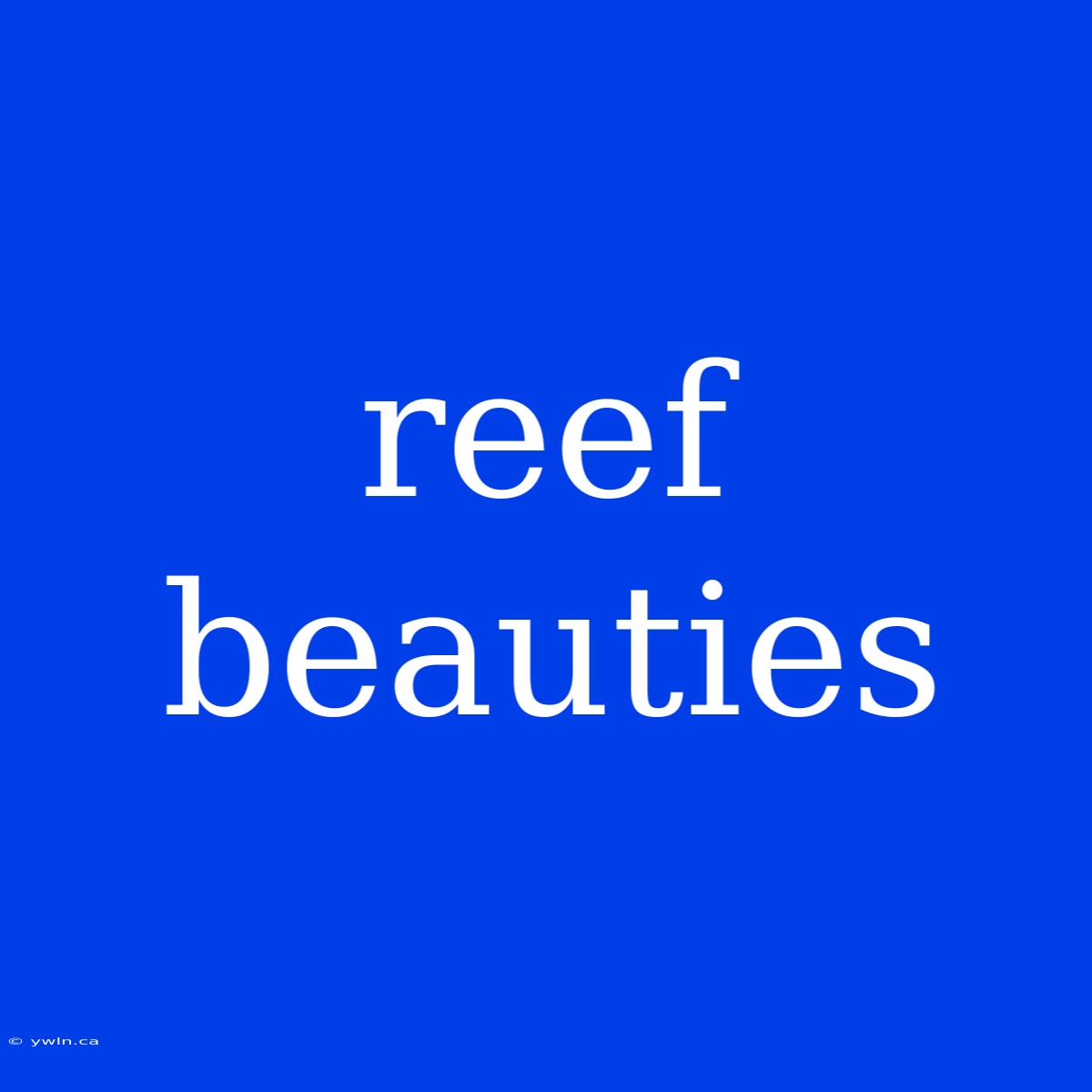Reef Beauties: Unveiling the Wonders of Coral Reef Ecosystems
What are coral reefs and why should we care? Coral reefs are vibrant underwater ecosystems teeming with life, often called the "rainforests of the sea." They are a haven for a dazzling diversity of marine species, contributing significantly to the health of our oceans and supporting the livelihoods of millions of people worldwide. Coral reefs are fragile and vital, requiring our attention and protection.
Editor Note: This article delves into the captivating world of coral reefs, highlighting their importance, beauty, and the urgent need for conservation.
Analysis: To understand the significance of coral reefs, we've undertaken a deep dive into their ecological, economic, and social contributions. We've analyzed the threats facing these ecosystems, exploring the causes and effects of coral bleaching, pollution, and overfishing. This comprehensive analysis will provide you with the knowledge needed to appreciate the intricate beauty and vulnerability of coral reefs.
Key aspects of coral reefs in a nutshell:
| Aspect | Description |
|---|---|
| Biodiversity | Home to a quarter of all marine species, providing essential habitats for fish, invertebrates, and even some marine mammals. |
| Ecosystem Services | Contribute to coastal protection, food security, and tourism, providing valuable goods and services for humans. |
| Economic Value | Estimated to be worth billions of dollars annually through tourism, fisheries, and pharmaceuticals. |
| Threats | Facing serious threats from climate change, pollution, overfishing, and habitat destruction. |
| Conservation | Requires a multi-faceted approach, including reducing greenhouse gas emissions, protecting habitats, and promoting sustainable practices. |
Coral Reefs: A Symphony of Life
The underwater landscapes of coral reefs are captivating. These intricate ecosystems are built by tiny animals called coral polyps, which secrete calcium carbonate to form hard skeletons. These skeletons create the structure of the reef, providing a foundation for a vast array of marine life.
Coral Polyps: The Architects of Beauty
Coral polyps are small, soft-bodied invertebrates that live in colonies. They are closely related to jellyfish and anemones, and they possess stinging tentacles to capture prey. Coral polyps form symbiotic relationships with algae called zooxanthellae, which provide them with food through photosynthesis. This symbiotic relationship is vital for the growth and survival of coral reefs.
A Vibrant Tapestry of Marine Life
Coral reefs are characterized by their astounding biodiversity. The intricate structures provide a complex habitat for a wide variety of species, including:
- Fish: From colorful clownfish hiding in anemones to majestic sharks patrolling the reefs, fish are a dominant component of the coral reef ecosystem.
- Invertebrates: From delicate seahorses to colorful starfish, invertebrates play vital roles in the reef's food web and ecosystem health.
- Marine Mammals: Dolphins, whales, and seals sometimes visit reefs, using them as feeding grounds or resting spots.
Threats to Coral Reef Beauty
The beauty of coral reefs is increasingly threatened by a combination of factors:
Climate Change: Rising sea temperatures cause coral bleaching, a process that leads to the loss of zooxanthellae and the death of coral polyps.
Pollution: Runoff from agriculture, industrial activities, and sewage can pollute reef waters, causing algal blooms and suffocating corals.
Overfishing: Excessive fishing can deplete fish populations, disrupting the balance of the reef ecosystem and making corals more vulnerable.
Habitat Destruction: Coastal development, dredging, and destructive fishing practices can directly damage coral reefs, destroying vital habitats.
The Need for Conservation
Coral reef conservation is crucial for the health of our oceans and the well-being of future generations. Efforts to protect these valuable ecosystems include:
- Reducing Greenhouse Gas Emissions: This is critical to mitigate the effects of climate change and prevent further coral bleaching.
- Establishing Marine Protected Areas: Creating protected areas that restrict human activities helps safeguard coral reefs from damage.
- Promoting Sustainable Fishing Practices: Managing fisheries to ensure the long-term sustainability of fish populations is vital for reef health.
- Reducing Pollution: Reducing pollution from land-based sources is essential to protect corals from damage.
Our Collective Responsibility
Coral reefs are a reminder of the interconnectedness of our planet and the importance of responsible stewardship. By raising awareness about the threats facing these ecosystems and supporting conservation efforts, we can help ensure that future generations can continue to enjoy their beauty and ecological benefits.
FAQs about Coral Reefs
Q: How important are coral reefs to human livelihoods?
A: Coral reefs are critical to the livelihoods of millions of people worldwide. They provide food security through fisheries, support tourism industries, and contribute to coastal protection.
Q: How are coral reefs being impacted by climate change?
A: Climate change is causing ocean temperatures to rise, leading to coral bleaching and increased disease susceptibility, ultimately impacting the overall health and survival of coral reefs.
Q: What can I do to help protect coral reefs?
A: You can support organizations working on coral reef conservation, reduce your carbon footprint, and choose sustainable seafood options.
Tips for Protecting Coral Reefs
- Reduce your carbon footprint: Make conscious choices to reduce your emissions, such as using public transport, cycling, or walking instead of driving.
- Support sustainable tourism: Choose eco-friendly tour operators and travel agencies that prioritize responsible practices.
- Choose sustainable seafood: Opt for seafood that has been certified as sustainably caught or farmed.
- Educate yourself and others: Share information about coral reefs and the threats they face with friends, family, and your community.
In Conclusion:
Coral reefs are a treasure trove of biodiversity and ecological significance. Their beauty and vitality are under threat, but we have the power to make a difference. By understanding the challenges they face and supporting conservation efforts, we can work towards a future where these magnificent ecosystems thrive. Our collective actions can ensure that these underwater wonders continue to inspire and amaze generations to come.

